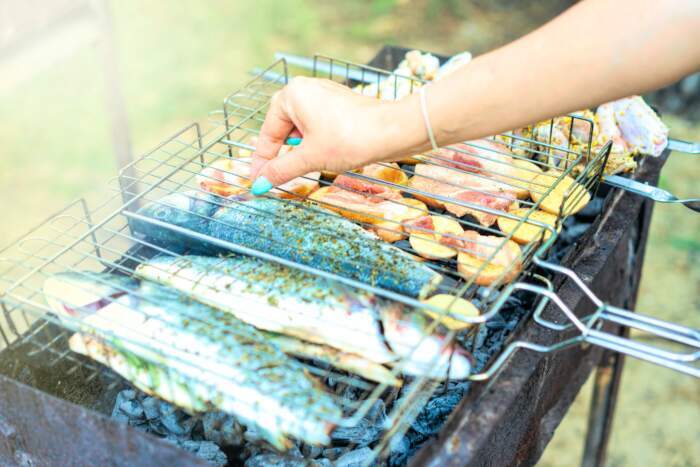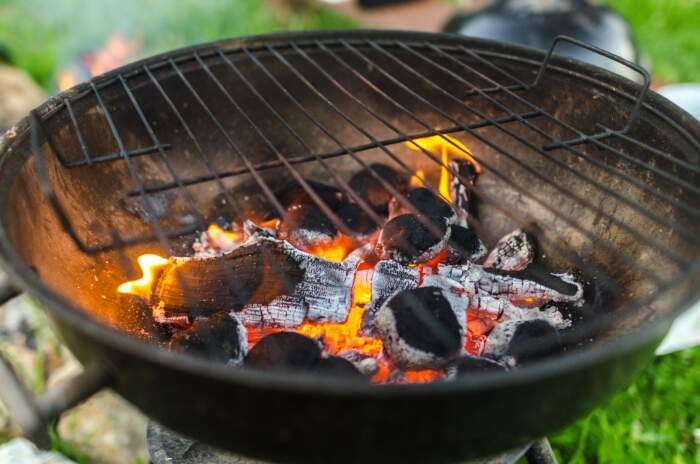In this simple guide, we will discuss the 7 Foods You Should Never Cook on a BBQ. We will explain the dangers and health risks associated with grilling these foods on a BBQ, as well as provide safe alternatives for preparing them.
1. Processed Meats: Unhealthy and Potentially Harmful
Examples of processed meats include hot dogs and bacon. These meats are often high in salt, nitrates, and preservatives, which can pose health risks when grilled. The high heat from the barbecue can cause the formation of harmful compounds, such as heterocyclic amines (HCAs) and polycyclic aromatic hydrocarbons (PAHs). These substances have been linked to an increased risk of cancer.
Safe Alternative: Opt for unprocessed, lean cuts of meat, like chicken or turkey, and marinate them in a mixture of herbs and spices to enhance flavour without adding harmful compounds.
2. Breaded Foods: Unsuited for Barbecue Cooking
Breaded items, such as fish sticks or chicken tenders, are not suitable for the barbecue. The high heat can cause the breading to burn quickly while the inside remains undercooked. Furthermore, the breading may fall apart, creating a mess on the grill.
Safe Alternative: To enjoy breaded foods, cook them in an oven or air fryer to achieve a crispy exterior without the risk of burning or undercooking.
3. Leafy Greens: Prone to Wilt and Lose Nutrients
Grilling leafy greens, like spinach or lettuce, can lead to wilting and loss of essential nutrients. The high heat can destroy heat-sensitive vitamins and minerals, diminishing the nutritional value of the greens.
Safe Alternative: Instead of grilling, toss your leafy greens in a delicious salad, or lightly sauté them to preserve their nutrients and texture.
4. Whole Potatoes: Inconsistent Cooking and Possible Health Risks
When grilling whole potatoes, the exterior may become overcooked while the inside remains raw. Additionally, cooking potatoes at high temperatures can cause the formation of acrylamide, a potentially harmful substance linked to an increased risk of cancer.
Safe Alternative: To enjoy potatoes on the barbecue, slice or cube them, and wrap them in foil with seasonings. This method ensures even cooking and minimises acrylamide formation. If you do want to cook some delish jacked potatoes, make sure your bbq is not too hot, cook them slower on a lower temperature. Making use of heat deflectors or just little coal should do the job!
5. Soft Fruits: Turn to Mush on the Grill
Grilling soft fruits, like bananas, strawberries, or ripe peaches, may result in a mushy texture and loss of flavour. The high heat can break down the fruit’s cell structure, causing it to become overly soft and unappealing.
Safe Alternative: Choose firmer fruits, such as pineapple or apples, for grilling. These fruits hold up better to the heat and provide a delicious, caramelised flavour when grilled.
6. Delicate Fish: Difficult to Grill Without Falling Apart

Grilling delicate fish, like flounder or tilapia, can be challenging due to their fragile texture. These fish types are prone to sticking to the grill or falling apart during cooking.
Safe Alternative: Opt for sturdier fish, such as salmon or tuna, when grilling. Alternatively, use a fish basket or grill mat to prevent delicate fish from sticking or breaking apart.
7. Thick-Cut Steaks: Uneven Cooking and Potential Health Risks
Grilling thick-cut steaks may result in uneven cooking, with the exterior becoming overcooked while the interior remains undercooked. Additionally, the high heat can cause the formation of harmful compounds, such as HCAs and PAHs, which are associated with an increased risk of cancer.
Safe Alternative: Choose thinner cuts of steak or use the reverse-sear method, where you cook the steak at a low temperature first, then sear it over high heat to achieve a perfectly cooked, flavourful crust.
Conclusion: Make Healthier Choices for Your Barbecue
By avoiding the seven foods mentioned in this Foods You Should Never Cook on a BBQ guide, you can enjoy a healthier and safer barbecue experience. Opt for lean, unprocessed meats, choose sturdier fruits and vegetables, and employ cooking techniques that minimise the formation of harmful compounds. By making these simple changes, you can ensure that your next barbecue is both delicious and good for your health.

Never Miss a Bite!
Get delicious new recipes weekly, cooking tips, exclusive discounts, and food inspiration delivered straight to your inbox. Sign up to our free newsletter today!
